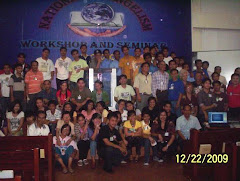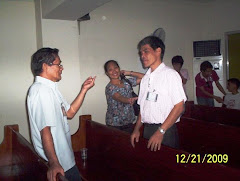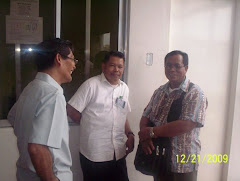 “Where are you going and how long will you be away?”
“Where are you going and how long will you be away?”That’s my youngest child Abby asking. My former students at the Manila School of Evangelism would remember that little girl five years old in 1989 who kept telling them she missed her mother and that she wanted to go home, but she would not without her daddy. Her way to defy parental separation was to leave her mom for a while and live with me as I kept transferring from one job to another. Yes, she was that close to me when she was young. But the long night time in that school room that became our sleeping quarters after school hours would often pester her heart like a virus. She would cry out for Dioly’s motherly presence and her way to connect with her was to pour tears over Mr. Felipe Cariaga’s junk phone, and I would grant her that wish—in my newfound skill of mastering the art of make believe— and she would cry on that phone the whole night, stopping only when sleep invited her to rest, and then she would blurt out in her gentlest way, teary-eyed and tired, “Pauli na ta” (”Let’s go home,” meaning to Bacolod, meaning leave this job). This rite repeated itself from day to day, from night to night.
Brother Rudy Gonzales of Olongapo City would probably remember that little child who would not separate from me even in her sleep. We slept for a night in their house in Upper Kalaklan. This is so because after that stint with Manila School of Evangelism we found ourselves bound for a new job at San Narciso, in Zambales. (Thanks for the hospitality and the good memories, brother Rudy!).
Abby’s cousins in San Narciso would remember that little girl who was always trying her hand at everything, including adjusting to the new environment I had forced her to adjust in, and she did, albeit with much fear. Months later her longings found satisfaction when her mom came to take her home. Abby was the child who in her innocent way did things to keep our family intact. She was my wake-up call. From that time on, there was no more separation.
As she grows older in our home in Cebu, she has come to enjoy her freedom–lots of it, including coming home very late at night. These days her mom is not home. And when I said I am leaving for a few days, which means she would be solo, she was back to her old childhood again. “What will I eat?” She was smiling of course. She has a job.
I think of my kids as three little boats. Time to let them loose on the ocean. Will they manage?
That too is a good question for me.
There is always that little child in our adulthood that suffers the empty nest syndrome. Because this world is not meant for living alone. Because this world is not a homestead in the jungle where you could try staking out your claim with just an axe and a hoe and a box of match sticks minus a wife or another company. God knew that, so He made an Eve from an Adamic rib.
Am 62 and an orphan, and I admit the child in me longs for that fatherly hug and motherly comfort too. I had lots of it when I was young; and they were as regular as the beatings of the ipil-ipil stick as big as my ring finger, which my parents had in handy, the better to ring me in whenever I thought of rebelling. I remember my ancestors, however, not for the stick but for the love they splurged on me.
Our daughter Karla is lonely too and she’s now a mother. Part of the solution is to get son and get mom. And so: Hello world. I have just entered this new state of my life: A grandfather without a grandson. A husband without a wife. And what separates us is a plane ticket and an hour’s flight.
I can’t help longing. When an adult 2 plus 60 years old starts to long, he becomes a child between 2 to 6. It is a system coming full circle. The adult child in me wants to resurrect my parents, the grandfather child in me wants to call back my grandson to my side. What would life be without Jacob? It is no longer a question of “Will he manage?” but “Will I manage?” When we start longing, we also miss our sense of balance.
We long for someone because our lives are diminished by their absence. Will denial diminish that feeling? My grandson Jake has come to master the art of grandpa snubbing. When I called his phone a week after they were gone, I heard a childish voice answer, “Cebu Pacific, may I help you?” I said I am looking for my grandson. “This is not Jacob. This is the ticket seller.” All right, may I reserve a ticket for Manila. April 26. Want to visit my grandson. “Sorry, Sir. All flights are fully booked. Please buy your ticket next year.”
I miss playing the game of make believe with the boy on the other line.
It is not fun when the ones you miss are not beside you. Cellphones may have shortened the distance. True, with a laptop and a webcam, via Yahoo Messenger, the voice and the face behind that cellphone becomes half of the reality that you are missing. But with these gadgets, communication becomes brief; the aches, the pains, and the fears are consigned only to a few sentences, sometimes with verbs without subjects, sometimes with subjects without verbs. We violate grammar rules to make communication concise. Even the tales of the squabbles are lost.
Ah. We still miss that reality’s other half.
Earthly longings may be forever, but the Lord has put it there for a purpose. The best longings is one for the real place up there. We long for our real Father. We miss our real Home.
Sometimes I think of heaven as one reality where I can be a child again. There I know I will be safe from all harms. There, the little child in us will find the real connection that made us one great heavenly family.



































